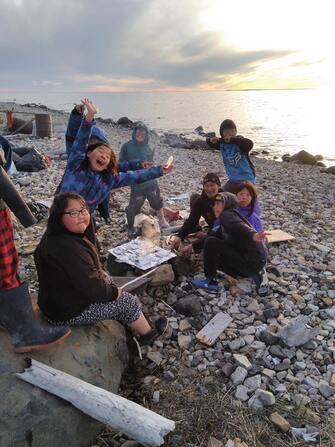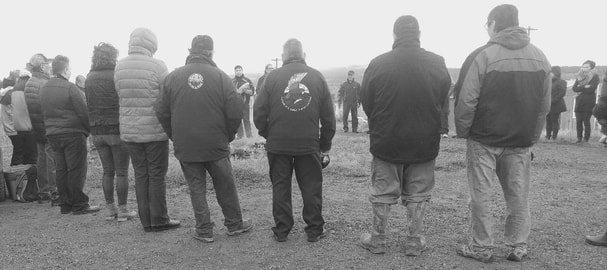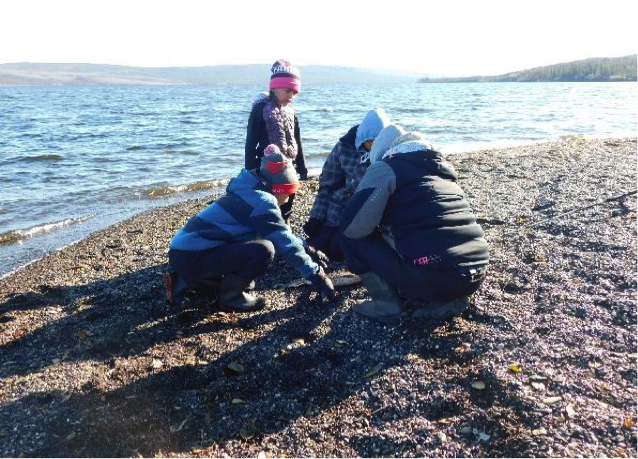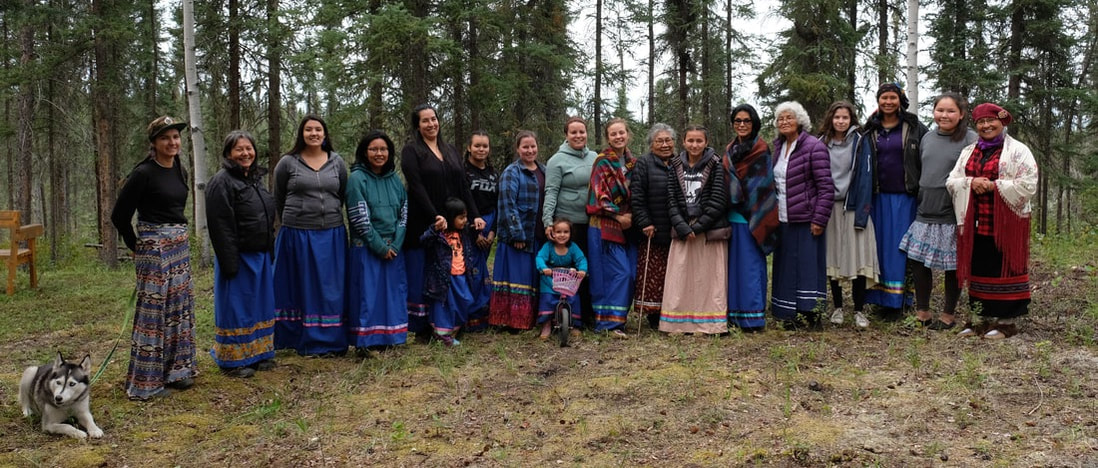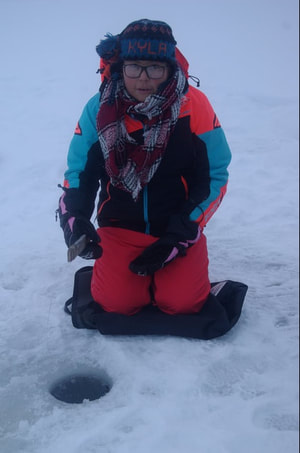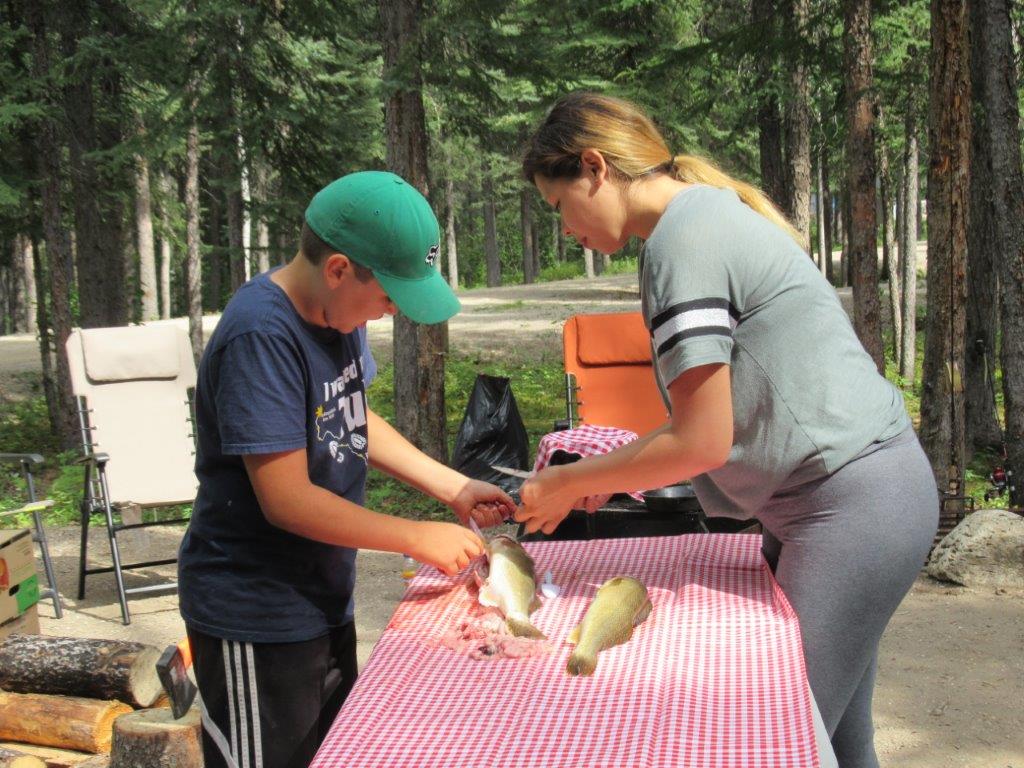Beaufort-Delta: Summer Language Camp
Objective: To teach children and youth the local Inuinnaqtun language through traditional camping activities. Description: Seventeen children from Ulukhaktok participated in the week-long language camp held at Kiigivik in July. Over the course of the week, the children learned how to set and check a fish net, as well as how to fillet and prepare arctic char for meals and for drying. They also learned how to harvest and process a bearded seal. During the camp, which was organized by the Ulukhaktok Community Corporation, the children worked with the camp leaders and staff to cut, flesh, wash, and dry a seal skin. When the weather prevented them from going out on the water or the land, they worked on different sewing projects.
Successes: The Inuinnaqtun language was a part of each day’s activities. The children heard and used the language as they prayed before mealtimes, but also as they fished and worked on seal meat. Sharing local place names in the language provided another way for the children to learn Inuinnaqtun.
|
South Slave: Rainbow River Retreat
Description: Twenty-five students and chaperones from schools around the South Slave took part in the first On the Land Rainbow River Retreat at Thebacha Campground near Fort Smith. Over three days in late September, the group, which included students from grades 7-12, deepened their understanding of LGBTQ2S+ issues, as well as their connection to land and culture. Guided by local Elders, the students harvested traditional plants, gathered firewood, went on nature walks, and prepared traditional food. They also participated in smudging circles and workshops, engaged in team building games and activities, held a talent show, and shared stories and strategies.
Successes: Hosted by Rainbow Sage (PWK High School’s Gay-Straight Alliance), the Rainbow Retreat provided students from the region with a safe, affirming, Indigenous-led, and land-based space in which they could learn more about gender, identities, and inclusive language and practices. Led by Elders and knowledge holders, the camp also created opportunities for the students to better understand Indigenous ways of knowing and being. In addition to strengthening the students’ connection to land and culture, the on the land activities played an important role in fostering a sense of community among the participants.
Akaitcho: Life as Akaitcho Dene
Description: Elders and youth from the five Akaitcho communities gathered together in Łútsëlk’é. From there, they travelled by boat to different points on Great Slave Lake and Stark Lake. Elders, youth, and land-users worked alongside each other to find their way on the water and also to navigate on land; to gather wood; to read the weather and water; and to harvest, process, and cook fish and meat. They also shared meals and stories. The gathering concluded with a drum dance and a hand games tournament organized by the youth.
Successes: Challenging weather didn’t stop the group from visiting different places around Łútsëlk’é and harvesting delicious food. Participants reported that the program didn’t force conversation. Rather, the focus on land-based skills naturally created opportunities for youth and Elders to talk and share knowledge. Programming has tended to favour the ideas of adults and Elders. A sharing circle at the end of the gathering, though, provided youth with an opportunity to tell the organizers and leaders what kind of activities and programs would interest them.
Successes: Challenging weather didn’t stop the group from visiting different places around Łútsëlk’é and harvesting delicious food. Participants reported that the program didn’t force conversation. Rather, the focus on land-based skills naturally created opportunities for youth and Elders to talk and share knowledge. Programming has tended to favour the ideas of adults and Elders. A sharing circle at the end of the gathering, though, provided youth with an opportunity to tell the organizers and leaders what kind of activities and programs would interest them.
Sahtú: Reintroducing Traditional Culture
Objective: To create opportunities for community members to learn traditional skills and Dene language in a family-oriented camp setting. Description: Twenty-nine people between the ages of 4 and 78 participated in the Tulít’a Dene Band’s cultural camp at Stewart Lake. Alongside their grandparents and parents, children and youth learned how to: set up camp, gather different kinds of firewood, and prepare for and travel on the land. Guided by the Elders and experienced land-users, they walked on and harvested along their traditional trails, returning to the camp to process meat and share berries. The young people also learned how to set nets from a canoe and clean fish. As they walked and fished and prepared food, they listened to stories about the old days.
|
Successes: In a safe, nurturing, family-oriented setting, children and youth learned a variety of traditional Shúhtagot’ı̨nę skills such as filleting fish and gathering medicine. The camp also created a supportive environment for sharing traditional knowledge and stories. The children were fascinated by the Dene science lessons and proud of their ability to make delicious drymeat. At the end of the two weeks, the young people asked if they could stay longer! A request was also received to host a winter camp.
NWT: Rites of Passage
Description: In late August, 19 Indigenous women and girls from Łı́ı́dlı̨ı̨ Kų́ę́, Teetł’it Zheh, Saamba K’e, Kakisa, Deh Gáh Got’ı̨ę, Sǫ̀mba K’è (Yellowknife), and Fort Nelson, came together on Ka’a’gee Tu First Nation territory for a week-long rites of passage camp. Coordinated by Dene Nahjo, an Indigenous leadership and innovation collective headquartered in Sǫ̀mba K’è, the gathering was an opportunity for participants to learn cultural and traditional teachings related to different life transitions, such as adolescence to adulthood, birth, partnering, and death. Together with their aunties, sisters, cousins, daughters, nieces, and grandmothers, participants also engaged in different on the land activities, including harvesting medicinal plants.
Successes: By providing a space for women of different ages to gather and learn from one another, the camp built and strengthened intergenerational relations. It further created a safe place for the transmission of culture. Mothers who attended the camp spoke of using the teachings in raising their children and participants spoke of sharing the teachings with their communities. The camp, through activities and conversations, also deepened the participants’ connection to land.
Tłı̨chǫ: Christmas Camp
Objective: To model the Dene Laws of community and giving rather than receiving at Christmastime through a land-based culture camp. Description: Just before Christmas break, Alexis Arrowmaker School students and community members set up camp at the Wekweètı̀ Culture Camp. The focus of the five-day camp was on ice fishing and craft making. Inspired by an instructor from Nunavut, the students were exposed to a different way of winter fishing, using a hand line and jig. They learned about hunting for the right ice, travelling safely on the ice and by snowmobile, and the patience needed to snag a fish or two or more! There was time each day for students to further develop their sewing and beading skills while they worked on homemade presents for their families.
Successes: As they travelled Teetł’it Gwinjik, the high school students gained a deeper understanding of the rhythms of the land, as well as learning the full process of trapping and harvesting animals in a land-based context. Younger students
also deepened their understanding of the land through different hands-on activities. Time with the Elders is important for all of the students’ mental and emotional wellbeing. Nitso Nankat Tr’iqwandaih, which employs local land-users and Elders, strengthens the school’s ties with the community. Being on the land also contributes to strong working relationships between the students and teachers. |
Dehcho: Community Trips on the Land
Objective: To support families in building stronger, healthier relationships with each other and the land, and to create opportunities for the transfer of traditional knowledge and land-based skills through multi-day camps. Description: A Collaborative grant in 2017 supported West Point First Nation (WPFN) to undertake a series of day trips. Over the course of the year, participants learned how to set nets under the ice, snare rabbits, and harvest cranberries. WPFN built on the success of these activities in 2018 by offering five multi-day camps at different sites around the Dehcho. Participants learned how to set up and maintain a camp, collect wood, harvest fish, make dry fish, and harvest spruce gum. They also made tobacco bundles and dream catchers.
|
Successes: The camps had a number of positive outcomes related to food security, community wellbeing, and youth engagement. They provided community members with opportunities to learn how to harvest food and medicine from the land. They were intergenerational spaces in which community members worked and played together. They were readily enjoyed by children and youth. At the beginning of 2018, many community members did not feel comfortable spending the night on the land. By the end of the year, they were asking about the next community camp!
